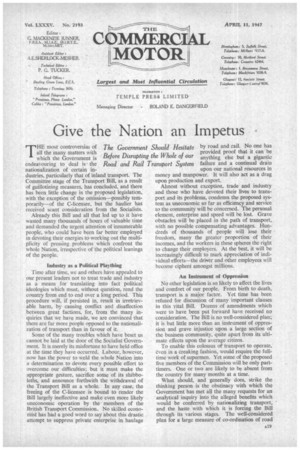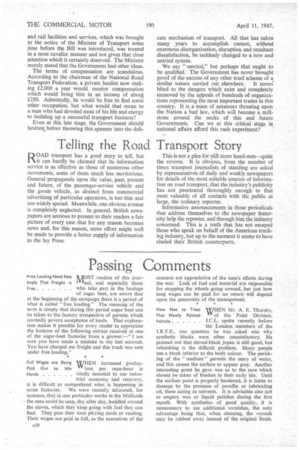Give the Nation an Impetus
Page 21

Page 22

If you've noticed an error in this article please click here to report it so we can fix it.
THE most controversial of all the many matters with which the Government is endeavouring to deal is the nationalization of certain industries, particularly that of inland transport. The Committee stage of the Transport Bill, as a result of guillotining measures, has concluded, and there has been little change in the proposed legislation, with the exception of the omission—possibly temporarily—of the C-licensee, but the haulier has received scant consideration from the Socialists.
Already this Bill and all that led up to it have wasted many thousands of hours of valuable time and demanded the urgent attention of innumerable people, who could have been far better employed in devoting their energies to working out the multiplicity of pressing problems which confront the whole Nation, irrespective of the political leanings of the people.
Industry as a Political Plaything Time after time, we and others have appealed to our present leaders not to treat trade and industry as a means for translating into fact political ideologies which must, without question, rend the country from end to end over a long period. This procedure will, if persisted in, result in irretrievable harm, by causing conflict and disaffection between great factions, for, from the many inquiries that we have made, we are convinced that there are far more people opposed to the nationalization of transport than in favour of it.
Some of the many troubles which have beset us cannot be laid at the door of the Socialist Government. It is merely its misfortune to have held office at the time they have occurred. Labour, however, now has the power to weld the whole Nation into a determination to devote every possible effort to overcome our difficulties; but it must make the appropriate gesture, sacrifice some of its shibboleths, and announce forthwith the withdrawal of the Transport Bill as a whole. In any case, the freeing of the C-licensee is bound to render the Bill largely ineffective and make even more likely uneconomic operation by the members of the British Transport Commission. No skilled economist has had a good word to say about this drastic attempt to suppress private enterprise in haulage by road and rail. No one has provided proof that it can be anything else but a gigantic failure and a continual drain upon our national resources in money and manpower. It will also act as a drag upon production and export.
Almost without exception, trade and industry and those who have devoted their lives to transport and its problems, condemn the proposed system as uneconomic so far as efficiency and service to the community will be concerned. The personal element, enterprise and speed will be lost. Grave obstacles will be placed in the path of transport, with no possible compensating advantages. Hundreds of thousands of people will lose their freedom, many the greater proportion of their incomes, and the workers in these spheres the right to change their employers. At the best, it will be increasingly difficult to mark appreciation of indi vidual efforts the driver and other employees will become ciphers amongst millions.
An Instrument of Oppression No other legislation is so likely to affect the lives and comfort of our people. From birth to death, transport is a major factor. Yet time has been refused for discussion of many important clauses in this vital Bill. Dozens of amendments which were to have been put forward have received no consideration. The Bill is no well-considered plan; it is but little more than an instrument of oppression and grave injustice upon a large section of the business community, quite apart from its ultimate effects upon the average citizen.
To enable this colossus ot transport to operate, tven in a creaking fashion, would require the fulltime work of supermen. Yet some of the proposed five members of the Commission will be only parttimers. One or two are likely to be absent from the country for many months at a time.
What should, and generally does, strike the thinking person is the obstinacy with which the Government has met all the many requests for an analytical inquiry into the alleged benefits which would be conferred by nationalizing transport, and the haste with which it is forcing the Bill through its various stages. The well-considered plan for a large measure of co-ordination of road and rail facilities and services, which was brought to the notice of the Minister of Transport some time before the Bill was introduced, was treated in a most cavalier manner and not given that close attention which it certainly deserved. The Minister merely stated that the Government had other ideas.
The terms of compensation are scandalous. According to the chairman of the National Road Transport Federation, a private haulier now making £2,000 a year -would receive compensation which would bring him in an income of about £250. Admittedly, he would be free to find some other occupation, but what would that mean to a man who had devoted most of his life and energy to building up a successful transport business?
Even at this late stage, the Government should hesitaq before throwing this spanner into the deli cate mechanism of transport. All that has taken many years to accomplish cannot, without enormous disorganization, disruption and resultant dissatisfaction, be suddenly changed to a new and untried system.
We say "untried," but perhaps that ought to be qualified. The Government has never brought proof of the success of any other tried scheme of a similar nature carried out elsewhere. It seems blind to the dangers which exist and completely unmoved by the appeals of hundreds of organizations representing the most important trades in this country. It is a team of amateurs thrusting upon the Nation a bad law, which will become a millstone around the necks of this and future Governments. Can we at this critical stage in national affairs afford this rash experiment?




































































